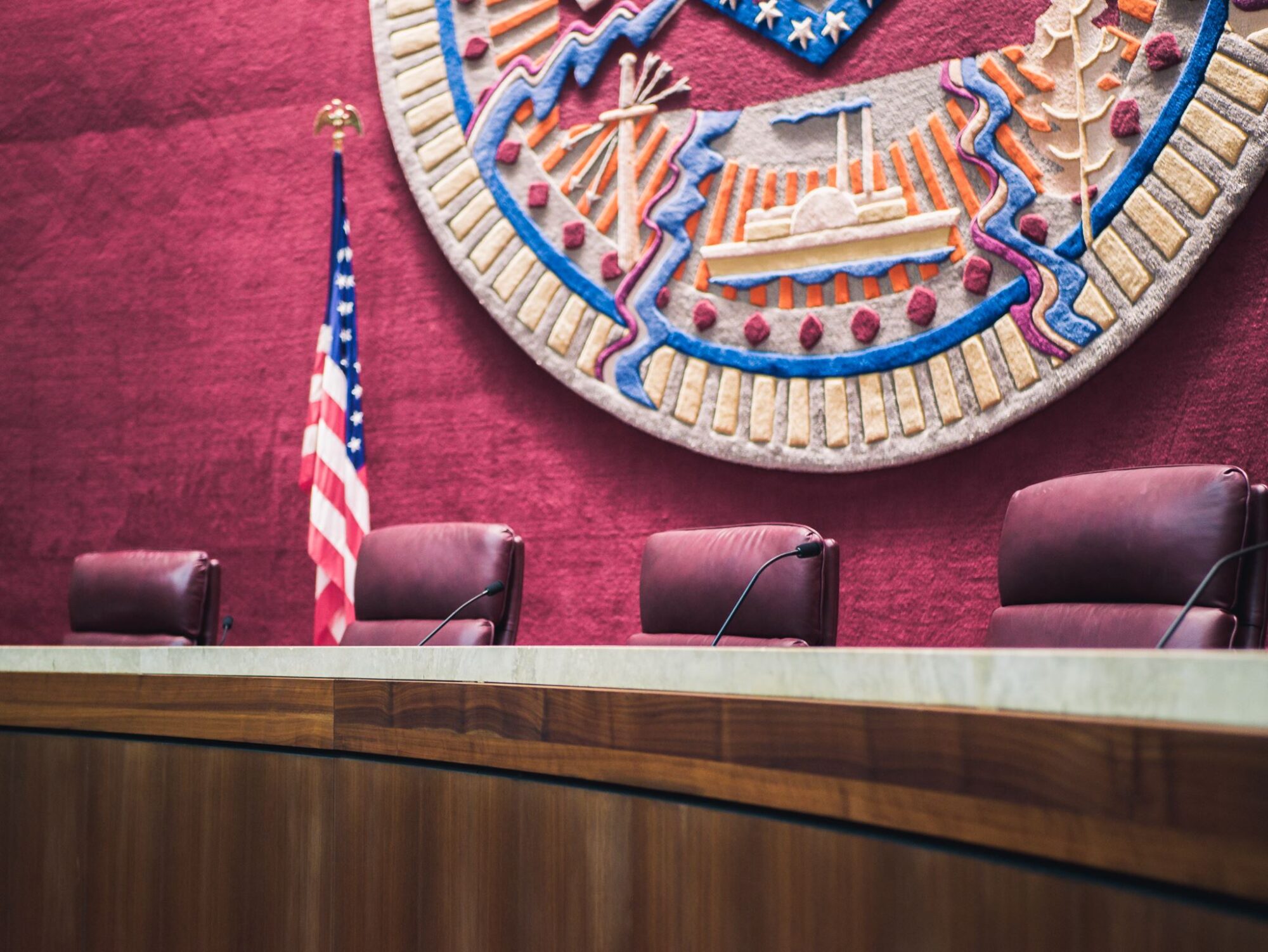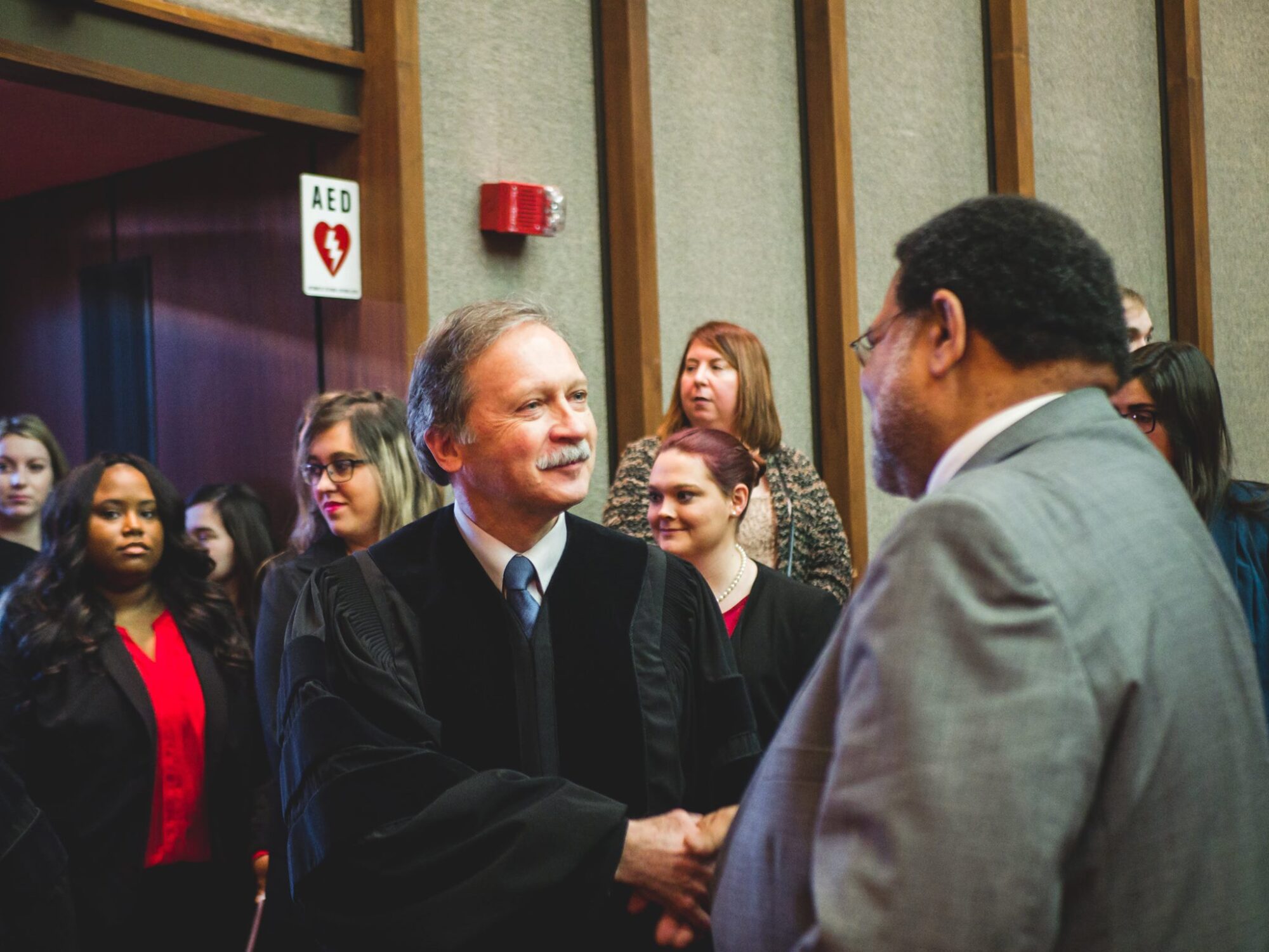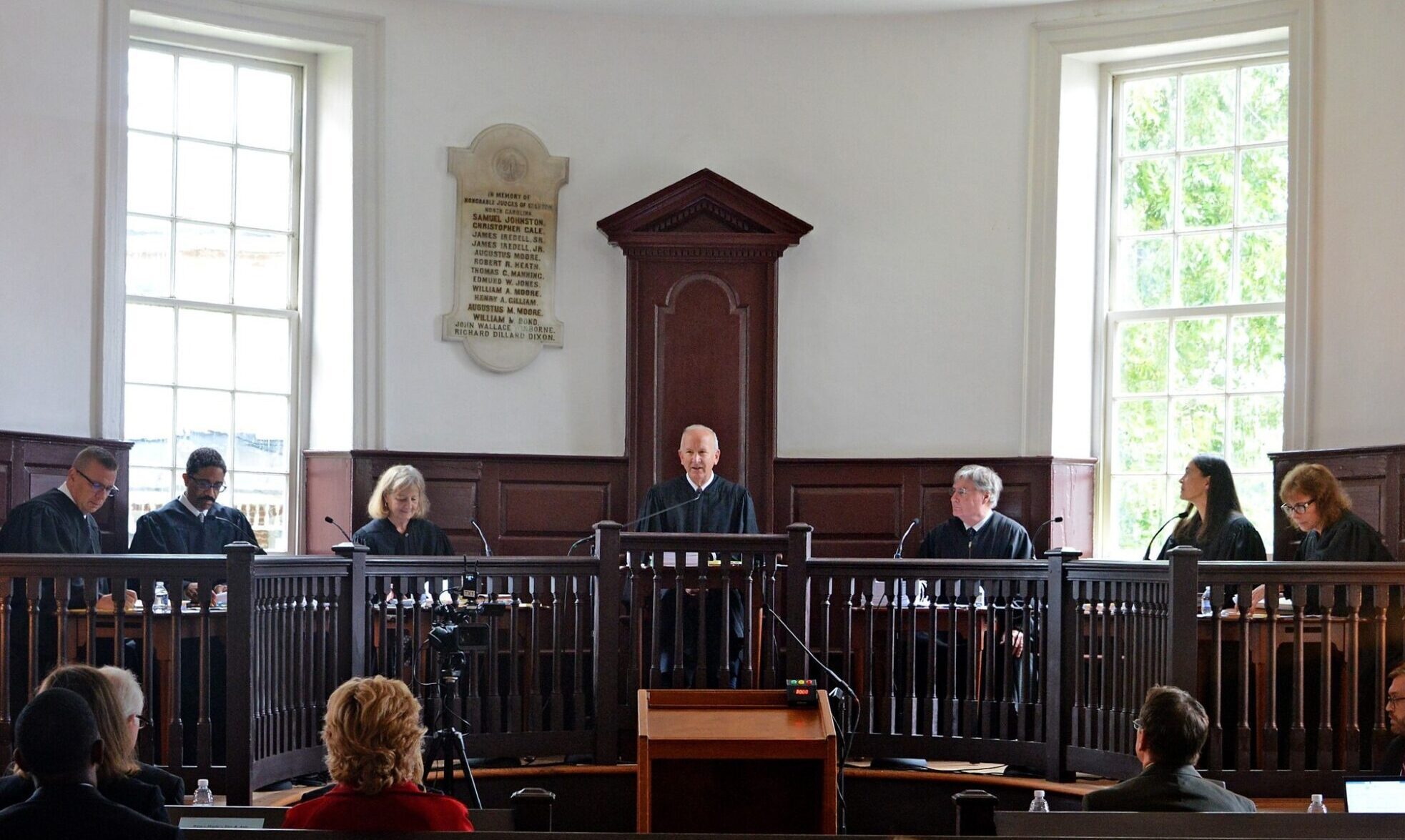Judges Play Musical Chairs on Arkansas’ Highest Court
Four members of the state supreme court are trying to jump to different seats on the bench, a situation that could empower the conservative governor by granting her more appointments.
Daniel Nichanian | February 22, 2024


Editor’s note: On March 4, Courtney Hudson won the election for Position 2 seat, 60 to 40 percent; the election for chief justice went to a November runoff between Karen Baker and Rhonda Wood.
There’s something odd about next month’s ballot in Arkansas.
Voters are filling two supreme court seats in two separate nonpartisan elections. Neither seat’s current occupant is seeking a new term, so at first glance it may look like the cycle will add two fresh faces to the court. But of the six candidates running for these two seats, four are already sitting justices on the court—they just want to shift into different seats than their own.
If justices who already sit on the supreme court win either of those seats, they would then need to resign from their current positions. This would create vacancies that would be filled by the state’s staunchly conservative governor, Sarah Huckabee Sanders, a reshuffling that’s poised to accelerate the court’s shift toward a solidly right-wing majority.
“Almost inevitably, the governor is going to end up with some appointments here,” said Jay Barth, a professor emeritus at Hendrix College who has long studied Arkansas politics. “And the more she gets, the more conservative the court is likely to get as well.”
The only two candidates not already on the court face tough odds, crushed by their opponents’ name recognition and fundraising. Each told Bolts that they’re concerned about the prospect of the governor shaping the court’s membership when justices are supposed to be chosen by voters.
Many states select justices via elections, but then stretch the spirit of that approach. Justices in other states routinely resign before their term is up, enabling governors to name a replacement; in Minnesota, for instance, all current justices owe their seat to an appointment despite the state’s election system. As Bolts has reported, a loophole in Georgia law has even allowed state justices and other officials to maneuver to outright cancel some judicial elections.
In Arkansas, the reasons for this situation are very different across the two elections. One of the two open supreme court races this year is to replace Chief Justice John Dan Kemp, who is retiring rather than seek a new term. Three of the court’s associate justices—Karen Baker, Barbara Webb, and Rhonda Wood—are running for the open chief justice position, which is akin to seeking a promotion, since the chief justice has broad responsibilities over supervising the state’s judicial system.
It’s not unusual for an associate justice to run for chief justice, but already sitting on the court is not a necessary stepping stone. Kemp was not on the court in 2016 when he successfully ran for chief justice. This year too, there’s a candidate running from the outside: Jay Martin, an attorney and former lawmaker, argues it’s an asset that he’s not already a justice. “I just think that we need a fresh pair of eyes on the court in the role of chief justice,” Martin told Bolts. (This race will head to a November runoff if no one tops 50 percent on March 5.)


Arkansas’ other open supreme court race is a special election that was triggered by the death last summer of Associate Justice Robin Wynne. It pits another outsider to the supreme court—Carlton Jones, a lower-court judge—against another sitting associate justice, Courtney Hudson, who is attempting to switch to the open associate justice seat. (With only two candidates in this race, one of them is sure to win outright in March.)
There’s no promotion at play here; Hudson’s current seat (“Position 3”) and the seat she is running for (“Position 2”) both fill the same role. What’s different between them is the timing of their elections.
“By running for Position 2, I can potentially serve longer as a justice on the Court and continue my work of ensuring that everyone benefits from the goodness and protection of the law,” Hudson told Bolts this week.
Switching seats would allow Hudson to spend more time on the court, circumventing the state’s retirement age by a few extra years. Arkansas rules strip justices of retirement benefits if they run for reelection past age 70 but don’t force them to resign once they hit 70; justices can finish whatever term they’re already serving without endangering their benefits, thus the exact timing of their terms determines when they must retire.
For Hudson, these are all considerations for a very distant future since she is only 51. Even if she stayed in her current seat, the earliest she’d have to retire is 2042. But if she succeeds at moving into the new seat this election, she’d be allowed to run as late as 2038 and serve out a final eight-year term until 2046—a potential four additional years on the court.
Jones, the lower-court judge challenging Hudson for the open seat, told Bolts in an interview that Hudson’s motivation for running was a “personal want,” comparing it unfavorably to what he called her three colleagues’ “legitimate reason” to run for chief justice. He added that a vacancy created by a Hudson win would be an “artificial opening” because of how unnecessary it is, and that this would betray the selection system that allows Arkansans to “express their choice through the ballot box.”
“These offices, they belong to the citizens of the state of Arkansas, and we should be doing those things that best serve them,” he added.
Hudson dismissed Jones’ concerns about her decision, saying it’s wrong to litigate the fate of the Position 3 seat during the campaign for Position 2. She said her experience makes her the best option to fill the open seat, telling Bolts, “The job of a Supreme Court Justice is far too important to wait for ‘on the job training’ to occur.”
Martin, who is challenging three sitting associate justices for the chief justice seat, says he does not fault his opponents for trying to “step up” into the role. But he echoed Jones’ assessment that these races, and the prospect of gubernatorial appointments looming over them, are in tension with the state’s commitment to judicial elections, a system that was ratified by voters in a 2000 ballot initiative.
“Arkansans made the decision to elect our judges, and not have the governor appoint judges,” Martin told Bolts. “We value electing judges.”
Wood, one of Martin’s opponents, does not share his concern, telling Bolts via email, “I believe the people of Arkansas would prefer an experienced Chief Justice with a proven judicial record versus risking the Chief Justice position on someone with no judicial experience only because some would prefer the Constitution provided an alternative method for filling the temporary vacancy.” Baker and Webb did not reply to requests for comment.
A vacancy in Arkansas sparks a special election in the next even-numbered year, and an appointed justice cannot run for a full term. So if Huckabee Sanders chooses one or two new justices, they’d serve for up to two and a half years; then, there’d be new open elections for those seats in 2026.
After Wynne’s death, for instance, the governor replaced him by appointing Cody Hiland, who was thus barred from running for the seat in the special election this year. But Barth says he expects Hiland to be on the shortlist for a new appointment to fill any vacancies that may result from the 2024 elections, which would extend his term on the court without facing voters to roughly three years. Hiland dodged the question of a reappointment when asked by The Arkansas Times earlier this month.


And important cases are looming just over the next few years, such as the challenge to a state law passed in 2023 that has significantly weakened direct democracy in the state. Relatedly, transparency advocates are embroiled in a legal saga against the state’s Republican attorney general who has blocked some popular initiatives from moving forward; the court is likely to weigh in on the fate of several ballot initiatives in coming years.
The reshuffling of the court also comes at a time of quick ascendancy for Arkansas conservatives.
While the state leans firmly to the right, its judiciary is divided between a more centrist and a more conservative wing, with recent elections producing some victories for the former. In 2022, conservatives failed in their effort to oust two justices whom they deemed to be too moderate—Baker, who is now running for chief justice, and Wynne, who passed away last year.
Those two justices, plus Hudson, formed an informal group of three moderates on the seven-member court. Barth says that Kemp, the retiring chief justice who was first elected in 2016, typically issued conservative rulings but sometimes sided with his more moderate colleagues. But Wynne’s death last year, and his temporary replacement with Hiland, a conservative, set up a more reliably conservative majority on the court made up of Hiland, as well as Webb and Wood, who are both now running for chief justice, and Shawn Womack, an associate justice who is running for reelection unopposed this year.
Kemp’s retirement could leave Baker and Hudson as the only two justices left on the court who have a more moderate reputation. Both are sure to stay on the supreme court no matter how they fare this year in their effort to switch seats. But if they win their upcoming races, the resulting appointments by Huckabee Sanders may shift the court yet another step to the right.
“It’s pretty clear that the governor will attempt to appoint conservatives in those positions, that’s been the nature of her appointments so far,” Barth said.
In their respective interviews with Bolts, Jones and Martin—the would-be newcomers to the court—each downplayed having ideological commitments, highlighting their independence. WIth candidates for judge in Arkansas running without any party label, that all makes it risky to predict how the court would rule on any issue even if they were to win.
Still, both have run for past offices as Democrats. Jones became prosecuting attorney in Lafayette and Miller counties, in southwestern Arkansas, running as a Democrat in 2010; he served until becoming a circuit judge in 2014. Martin, who says he’s now an independent, was a Democratic lawmaker and House Majority Leader in the mid-2000s, right before the state’s hard swing toward the GOP. He also ran for governor in 2022, coming in a distant third in the Democratic primary.
As he now runs against three sitting justices at once, Martin embraces his outsider status as the thing that distinguishes his campaign, even as his opponents hold it against him. “The presumption that any necessary change is stalled because there is not an outsider on the court is wrong,” Wood, one of the justices on the ballot, told Bolts in an email. “The Chief Justice role is not one that you can learn on the job.” Wood says she has goals of improving the court system, such as setting up a “web portal for victims of domestic violence” to file their documents.
Martin insists that his experience is relevant to the position. A volunteer pastor in Little Rock, he points to past activities like his involvement in an expungement clinic through his church as an example of the outsider’s perspective he’d want to bring. “I think that community involvement is very important to break up the status quo,” he told Bolts, denouncing the fact that many Arkansans lack access to legal help and end up unsuccessfully representing themselves in expungement proceedings or civil disputes with landlords.
Martin also told Bolts that his background as a former legislator would prime him to talk to lawmakers and identify funding sources in budget negotiations. He vowed to be “the chief advocate for more pro bono work for attorneys and law students” to improve the legal representation people receive.
“We can do a better job of providing services,” he said. Of his opponents who are already on the court, Martin added, “I think that it’s just easy to maintain the status quo after a number of years.”
Stay up-to-date
Support us
Bolts is a non-profit newsroom that relies on donations, and it takes resources to produce this work. If you appreciate our value, become a monthly donor or make a contribution.




